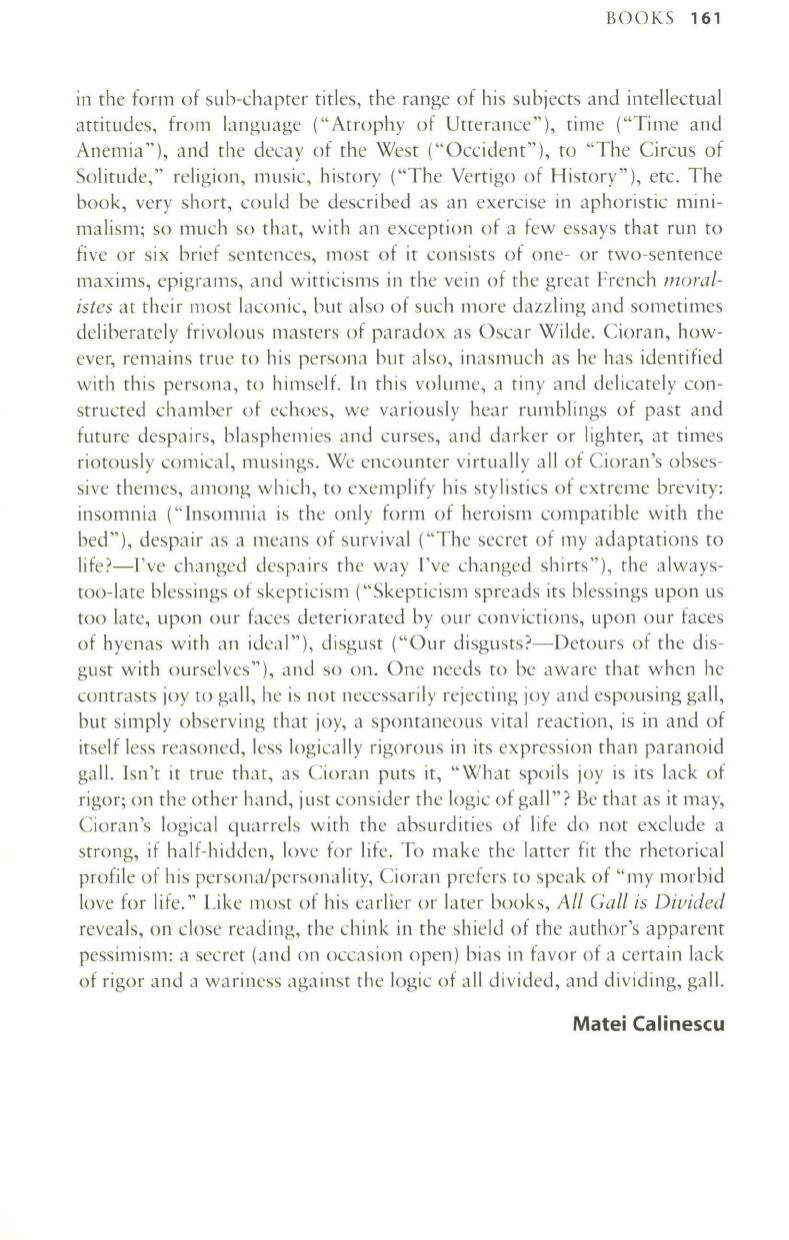
BOOKS
161
in the form of sub-chapter titles, the range of his subjects and intellectual
attitudes, from language ("Atrophy of Utterance"), time ("Time and
Anemia"), and the decay of the West ("Occident"), to "The Circus of
Solitude," religion, music, history ("The Vertigo of History"), etc. The
book, very short, could be described as an exercise in aphoristic mini–
malism; so much so that, with an exception of a few essays that run to
five or six brief sentences, most of it consists of one- or two-sentence
maxims, epigrams, and witticisms in the vein of the great French
moral–
istes
at their most laconic, but also of such more dazzling and sometimes
deliberately frivolous masters of paradox as Oscar Wilde. Cioran, how–
ever, remains true to his persona but also, inasmuch as he has identified
with this persona, to himself.
In
this volume, a tiny and delicately con–
structed chamber of echoes, we variously hear rumblings of past and
future despairs, blasphemies and curses, and darker or lighter, at times
riotously comical, musings. We encounter virtually all of Cioran's obses–
sive themes, among which, to exemplify his stylistics of extreme brevity:
insomnia ("Insomnia is the only form of heroism compatible with the
bed"), despair as a means of survival ("The secret of my adaptations to
life?-I've changed despairs the way I've changed shirts"), the always–
too-late blessings of skepticism ("Skepticism spreads its blessings upon us
too late, upon our faces deteriorated by our convictions, upon our faces
of hyenas with an ideal"), disgust ("Our disgusts?-Detours of the dis–
gust with ourselves"), and so on. One needs to be aware that when he
contrasts joy to gall, he is not necessarily rejecting joy and espousing gall,
but simply observing that joy, a spontaneous vital reaction, is in and of
itself less reasoned, less logically rigorous in its expression than paranoid
gall. Isn 't it true that, as Cioran puts it, "What spoils joy is its lack of
rigor; on the other hand, just consider the logic of gall"? Be that as it may,
Cioran's logical quarrels with the absurdities of life do not exclude a
strong, if half-hidden, love for life. To make the latter fit the rhetorical
profile of his persona/personality, Cioran prefers to speak of "my morbid
love for life." Like most of his earlier or later books,
All Gall is Divided
reveals, on close reading, the chink in the shield of the author's apparent
pessimism: a secret (and on occasion open) bias in favor of a certain lack
of rigor and a wariness against the logic of all divided, and dividing, gall.
Matei Calinescu


